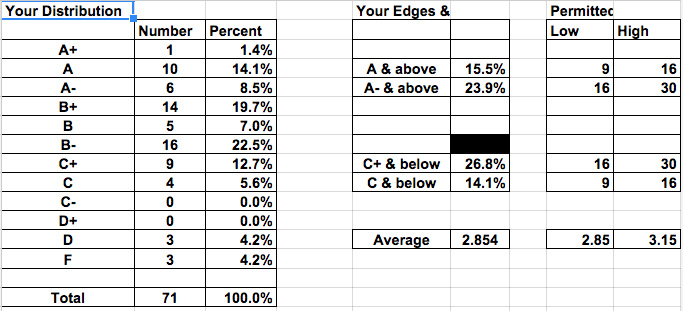I have now finished grading your constitutional law midterms. You can download the exam here, and the A+ paper is here. Here is the distribution.

To be frank, I had fairly high expectations for this section–based on engaging class discussions–but the exams were disappointing. The exams at the top of the class were excellent, but there was a sharp drop-off after the A- papers. Many of you repeated maxims about ambition checking ambition without any context–as if you were trying to write something to score points. That won’t work. I can tell when you are fudging the answers. Also, given a 1,000 word limit, many of you couldn’t muster more than 500 or 600 words. Use the space you are given to show me what you’ve learned. You can do better. The average grade for my ConLaw exams is usually around a 3.10. Yours was 2.85. There were also three failures, which I wasn’t expecting to give, but felt compelled to due to the weak submissions.
Here are some high-level observations about each question.
- The first question was a head fake that faked out almost every student in the class. With the exception of a few top papers, everyone treated the removal the Iranian ambassador to the United States as if he was someone the previous President appointed. The Iranian ambassador was selected by Iran. Therefore, this question really wasn’t one of the removal power, at all, but was a question of the recognition power discussed in Zivotofsky. It was striking how few of you picked up on this. The question was whether Congress can put limits on the President’s power to reject a foreign ambassador follows pretty closely from Zivotofsky, and the answer is no. Even if Congress has power over commercial relations with Iran, they cannot interfere with which ambassadors the President chooses to accept or reject. (Whether this aspect of Zivotofsky is defensible or not is a different story).
- The second question was a reverse Marbury. Article III, Section II of the Constitution provides that in “Cases affecting ambassadors” the Supreme Court has original jurisdiction. The Judiciary Act of 2017 vests jurisdiction in the District Court for the District of Columbia for all cases affecting terrorism prosecutions. On its face, there is no conflict with Article III. However, if the former Iranian ambassador is in fact an ambassador there is a conflict, as the Supreme Court would otherwise have original jurisdiction over his case. (In case you are curious, the Supreme Court once did hold a jury trial, which was the inspiration for this question). If that were the case, Congress is stripping away the Court’s original jurisdiction. Marbury said that Congress could not expand the Court’s original jurisdiction. But can it strip it? This is actually a close question that scholars have been arguing about for a very long time, but it is one that I would accept any answer to. However, if he was not in fact an ambassador any longer, he could in no sense avail himself of the Court’s original jurisdiction.
- This question was a combination of Youngstown and the non-delegation doctrine. Truman’s seizure of property in Youngstown was invalidated because Congress did not delegate that power to him. Here, Congress purports to give the President the power over eminent domain, through a grant of “all powers that are necessary and proper to secure the southern border.” This is a grant of a boundless legislative power from the Congress to the Executive, which would almost certainly violate the non-delegation doctrine, even in its current moribund form. Also, the decision of how much to award for just compensation must be made through a judicial proceeding, so the executive could not do so by his own decision.
- Deferred Action for Tax Evaders was based on DAPA. The key point to explore here was whether the President’s actions were consistent with his duty to take care that the laws are faithfully executed. The question stressed that Congress only appropriates enough money to audit 400,000 people per year, even though there are an estimated 11 million people who do not file tax returns. (These numbers parallel the numbers in U.S. v. Texas for immigrants and removals). A proper answer would discuss the role of prosecutorial discretion and good faith enforcement. Again, I would accept any answer that touches on these points, regardless of which way it comes out.
- The final question was where you were supposed to shine, and show me that you embraced a lot of the policy discussions we went through in class. I’m glad many of you remembered the maxim, “in times of war, the laws fall silent,” and ably cited Korematsu. That was a good start. But better, more nuanced answers engaged others cases, such as Curtiss-Wright, Dames & Moore, and even the Guantanamo cases which we mentioned in class.
So what comes next? I will be holding a review session on Friday from 2:00-3:30 (Room TBD). It will be recorded. You will be able to pick up the papers from Cindi Lowrimore, whose office is across the hall from mine, starting Friday morning at 9. If you can’t pick up your papers on Friday, they will available the following week. Students who received a C- or lower are required to meet with me–and they will receive priority in scheduling office hours. Everyone else who wishes to meet with me can schedule an appointment–once all of the mandatory meetings are scheduled.